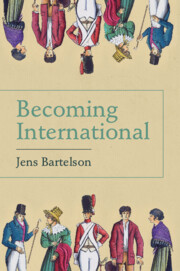Book contents
- Becoming International
- Becoming International
- Copyright page
- Dedication
- Contents
- Preface
- 1 Making Sense of the International
- 2 Dividing the World
- 3 Empire and Independence c.1776–c.1825
- 4 Empire and Self-Determination, c.1820–c.1919
- 5 The Empire of the International
- 6 From the International to the Global and Beyond?
- Bibliography
- Index
4 - Empire and Self-Determination, c.1820–c.1919
Published online by Cambridge University Press: 12 October 2023
- Becoming International
- Becoming International
- Copyright page
- Dedication
- Contents
- Preface
- 1 Making Sense of the International
- 2 Dividing the World
- 3 Empire and Independence c.1776–c.1825
- 4 Empire and Self-Determination, c.1820–c.1919
- 5 The Empire of the International
- 6 From the International to the Global and Beyond?
- Bibliography
- Index
Summary
Chapter 4 deals with the rise of nationalism and pleas for self-determination during the latter half of the nineteenth century and describes some attempts to reconcile these with notions of empire and imperial rule. When the principle of nationality became constitutive of statehood towards the end of that century, this principle was used to justify wars of unification in Europe. But this principle also provided a new and potent justification of colonial rule at a moment when earlier standards of sovereignty and civilization were increasingly contested. Whereas European peoples were deemed ripe for self-government by virtue of constituting homogenous nations, non-European peoples were considered unfit for self-government on the grounds that they lacked the defining characteristics of nationhood and should therefore remain under European tutelage. Yet the idea of nationality was soon appropriated by anticolonial nationalists to debunk empire and imperial rule and to support claims to self-determination of non-European peoples. Although most of those claims were initially unsuccessful, the spread of anticolonial nationalism and the contestations of standards of legitimacy and recognition that ensued made membership of the international system the obvious escape route from imperial domination.
- Type
- Chapter
- Information
- Becoming International , pp. 115 - 165Publisher: Cambridge University PressPrint publication year: 2023



